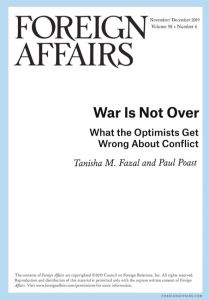Join getAbstract to access the summary!

Join getAbstract to access the summary!
Tanisha M. Fazal and Paul Poast
War Is Not Over
What the Optimists Get Wrong About Conflict
Foreign Affairs, 2019
What's inside?
The world may have been getting safer, but the risk of future wars remains unaltered.
Recommendation
Is the world getting better or worse? Well, it depends on how you read the statistics. In this engaging article, political scientists Tanisha M. Fazal and Paul Poast challenge an increasingly influential claim in academic and political circles: that despite the daily deluge of negative news stories, a higher percentage of the world population is living in relative peace today than at any other point in history. The authors’ exploration of the flaws in this line of argument will intrigue optimists and pessimists alike.
Summary
About the Authors
Tanisha M. Fazal is Associate Professor of Political Science at the University of Minnesota. Paul Poast is Associate Professor of Political Science at the University of Chicago and a Nonresident Fellow at the Chicago Council on Global Affairs.
















Comment on this summary